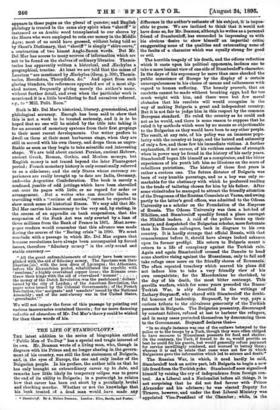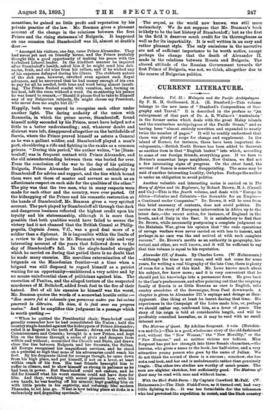THE LIFE OF STAMBOULOFF.*
THE latest addition to the series of biographies entitled Public Men of To-Day" has a special and tragic interest of its own. Mr. Beaman wrote of a living man, who, though in disgrace with his Prince and no longer sharing in the govern- ment of his country, was still the first statesman of Bulgaria, and, in the eyes of Europe, the one and only leader of the Bulgarian people. In his preface, the author tells us that he has only brought an extraordinary career up to date, and remarks how little likely its temporary eclipse was to prove the end of its utility to Bulgaria; in a postscript he relates how that career has been cut short by a peculiarly brutal and shocking murder. Whether or not the knowledge that his book treated of a dead man would have made any • Stambuloff. By A. Hulme Beaman. London : B]iss, Sandm, and Foster.
difference in the author's estimate of his subject, it is impos- sible to guess. We are inclined to think that it would not have done so, for Mr. Beaman, although he writes as a personal friend of Stambouloff, has succeeded in impressing us with his obvious desire to show himself an impartial critic, exaggerating none of the qualities and extenuating none of the faults of a character which was equally strong for good or evil.
The horrible tragedy of his death, and the odious reflection which it casts upon his political opponents, inclines one to take a more lenient view of one side of Stambouloff's character. In the days of his supremacy he more than once shocked the public conscience of Europe by the display of a certain unscrupulousness in his choice of means and callousness with regard to human suffering. The homely proverb, that an omelette cannot be made without breaking eggs, had far too much weight with him, and there were but few moral obstacles that his resolute will would recognise in the way of making Bulgaria a great and independent country. Bat it is not fair to judge him in this respect by the common European standard. He ruled the country as be could and not as he would, and there is some reason to suppose that he ruled it by methods which were by no means so objectionable to the Bulgarian as they would have been to any other people.
The result, at any rate, of his policy was an immense popu-
larity with the country at large, and the hatred and animosity of only a few, and those few his immediate victims. A further explanation, if not excuse, of his ruthless exercise of strength when in power may be found in the history of his early years.
Stambouloff began life himself as a conspirator, and the bitter experiences of his youth left him no illusions on the score of rebellious patriotism. The history of those first years is rather a curious one. The future dictator of Bulgaria was born of very humble parentage, and as a boy was only re- markable for the obstinacy with which he preferred reading to the trade of tailoring chosen for him by his father. After some vicissitudes he managed to attract the friendly attention of the Dragoman of the Russian Consulate at Varna, and owing partly to the latter's good offices, was admitted to the Odessa University as a scholar on the Foundation of the Empress of Russia. The Odessa University was then a hot-bed of Nihilism, and Stambouloff speedily found a place amongst the Nihilist leaders. A raid of the police broke up their society, and despatched the Bulgarian scholar, more fortunate than his Russian colleagues, back in disgrace to his own country. It is hardly strange that official Russia, with that remembrance before it, should have always looked askance upon its former protege. His return to Bulgaria meant a return to a life of conspiracy against the Turkish rule.
Again and again Stambouloff crossed the Danube to head some abortive rising against the Musstilman, only to fail and take refuge once more on the friendly shores of Roumania.
The often repeated treachery which marred his plans did not induce him to take a very friendly view of his own compatriots ; for the Macedonians he cherished, to the day of his death, the most bitter contempt. This guerilla warfare, which for some years preceded the Russo- Turkish War, is ably described in the writings of Zachary Stoyanoff, who shared with Stambouloff the doubt- ful honours of leadership. Stoyanoff, by the way, pays a curious tribute to the chivalrous generosity of the Turkish peasants in Bulgaria. The Bulgarian peasantry, discouraged by constant failure, refused at last to harbour the refugees, and in many cases protected themselves by denouncing them to the Government. Stoyanoff declares that-
" In no single instance was one of the outlaws betrayed to the police or to the troops by a Turk, though they were often obliged to have recourse to Mussulman peasants for food and shelter. On the contrary, the Turk, if forced to do so, would provide as best he could for his guests, but would generally refuse payment for service unwillingly rendered, and scorned to betray them ; Whereas it is sad to relate that cases were not few in which Bulgarians gave the information which led to seizure and death."
The Russian War, in which, it need hardly be said, Stambouloff took an active part, left Bulgaria to begin a new life freed from the Turkish yoke. Stambouloff soon signalised himself by raising the cry of independence from foreign con- trol. As a Liberal and a Nationalist before all things, it is not surprising that he did not find favour with Prince Alexander and his advisers ; he was elected Deputy for Tirnovo, however, and under the first Liberal Ministry was appointed Vice-President of the Chamber ; while, in the meantime, he gained no little profit and reputation by his
private practice of the law. Mr. Beaman gives a pleasant account of the change in the relations between the first Prince and the rising statesman-of Bulgaria. It happened on one occasion that Stambouloff was ill, almost at death's
door :—
" Amongst his visitors, one day, came Prince Alexander. They had never yet met on friendly terms, and the Prince probably thought this a good opportunity of making his peace with the turbulent Liberal leader. In the kindliest manner he inquired after Stambnloff's health, asked him if he might send him deli- cacies, fruit, and old wine from his cellars, and if he wished any of his expenses defrayed during his illness. The stubborn nature of the sick man, however' revolted even against such Royal advances, and he answered that he had money enough of his own to pay for all he needed, both tone and word being almost insult- ing. The Prince flushed scarlet with vexation, and, turning on his heel, left the room without a word. On re-entering his palace he was heard to remark,--` Should it please God to take to Himself any of my Bulgarian subjects, He might choose my President, who never does me aught but ill."
Happily, both were spared to recognise each other under another light. The daring audacity of the union with Roumelia, in which the prime mover, Stambouloff, found himself nobly seconded by his Prince, must have helped not a little to a better understanding ; and, whatever doubt and distrust were left, disappeared altogether on the battlefields of Servia, where the Prince proved himself as astute a General as he was a gallant soldier, and Stambouloff played a man's part, shouldering a rifle and fighting in the ranks as a common private. "During this period," the author writes, "he [Stam- bouloff] was in frequent contact with Prince Alexander, and the old misunderstanding between them was buried for ever.
From the conclusion of the war to the day of his quitting Bulgaria, Prince Alexander looked almost exclusively to Stambouloff for advice and support, and the ties which bound them were not those of master and servant so much as an affectionate respect on each side for the qualities of the other."
The pity was that the two men, who in many respects were made for each other and the country, were ever parted. Of the kidnapping of the Prince and his romantic restoration at the hands of Stambouloff, Mr. Beaman gives a very spirited account. The part played by Stambouloff all through that dark and dangerous business reflected the highest credit upon his loyalty and his statesmanship, although it is more than possible that both qualities would have failed to secure the victory had it not chanced that the British Consul at Philip- popolis, Captain Jones, VC., was a good deal more of a soldier than a diplomat. It is impossible within the limits of a review to do justice to Mr. Beaman's very able and very interesting account of the years that followed down to the day of Stambouloff's fall. In the single-handed struggle which he carried on during that period there is no doubt that he made many enemies. His merciless extermination of the brigands on the Macedonian frontier—at a time when a brigand was still disposed to regard himself as a patriot waiting for an opportunity...rembittered a very active and by no means uninfluential class of politicians against him. The execution of Panitza, and the alleged torture of the suspected murderers of M. Belteheff, added fresh fuel to the fire of their hatred. But of all his enemies he himself was the worst, Mr. Beaman quotes the words of a somewhat hostile critic :— "Son cewure Jut si colossal elque personne autre que lui-mgme pourrait la cleitruire. Eh :bien, il is fait 01)8C ses propres mains." And he amplifies this judgment in a passage which is worth quoting
When he quitted the Presidential chair, Stambuloff could proudly remember how he had consolidated the Union ; held the country single-handed againstthe kidnappers of Prince Alexander; ruled it as Regent in the teeth of Russia ; driven out the Russian Commissioners and Consuls ; brought in a new Prince, and kept him on the throne through a series of plots and dangers from within and without; reconciled the Church and State, and drawn close the ties between Bulgaria and her Suzerain, the Sultan. All Europe recognised his magnificent services, and he stood on a pedestal so high that none of his adversaries could reach his feet. By his desperate thirst for revenge though, he came down from his high place, and put himself, if not on a level, at least within reach of his foes. His best friends besought him to suffer in silence, and to show himself as strong in patience asks had been in power. Bat Stambuloff could not endure, and he did for himself what his worst enemies could not have done for him. And they, watching with secret pleasure how, with his own hands, he was tearing off his armour, kept goadifig him on with little pricks in his captivity, and refusing, like modern Pharaohs, to.let him go, What is now taking place at Sofia is a melancholy a4degiing spectacle." The sequel, as the world now knows, was still more melancholy. We do not suppose that Mr. Beaman's book is likely to be the last history of Stambouloff ; but as the first In the field it deserves much credit for its thoroughness as well as for its impartiality. It is well written in an easy and rather pleasant style. The only omissions in the narrative are not of sufficient importance to be worth notice, except perhaps the change that the death of Alexander II. made in the relations between Russia and Bulgaria. The altered attitude of the Russian Government towards the first Prince of Bulgaria, was not, we think, altogether due to the course of Bulgarian politics.



































 Previous page
Previous page